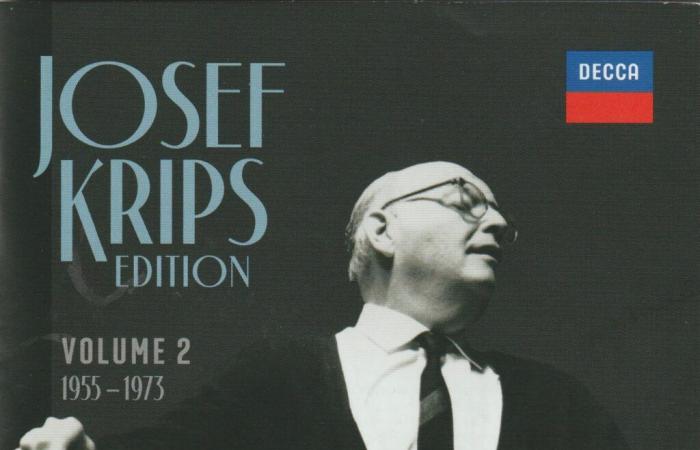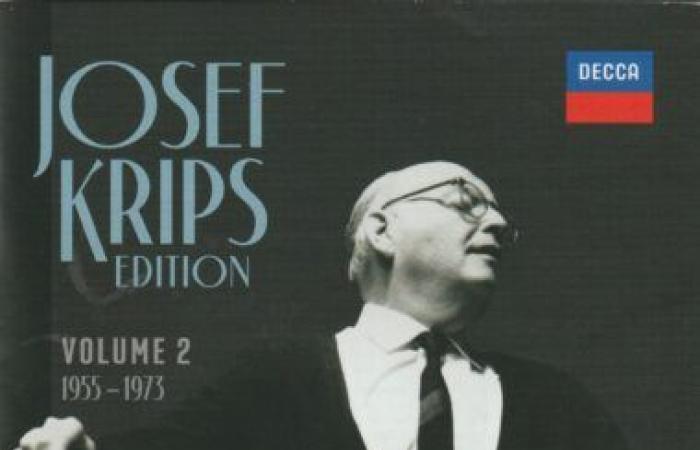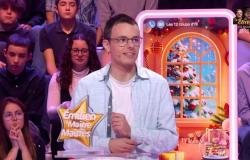More details
Josef Krips Edition, volume I (1947-1955): Ludwig van Beethoven (1770-1827): Violin concerto. Symphony No. 4. Vincenzo Bellini (1801-1835): extracts from La Sonnambula. Georges Bizet (1838-1875): extracts from Les Pêcheurs de Perles. Johannes Brahms (1833-1897): Symphony No. 4. Anton Dvorak (1841-1904): Cello concerto. Charles Gounod (1818-1893): extracts from Faust. Joseph Haydn (1732-1809): Symphonies n° 92, 104. Jules Massenet (1842-1912): extracts from Manon. Felix Mendelssohn (1809-1847): Symphony No. 4. Elias. Modest Mussorgsky (1839-1881): extracts from Boris Godunov. Wolfgang Amadeus Mozart (1756-1791): Requiem. The Abduction from the Seraglio. Various tunes, The Marriage of Figaro, Don Giovanni, The Magic Flute, Cosi fan Tutte. Overtures from The Marriage of Figaro, The Magic Flute, Cosi fan Tutte, Marriage of Figaro, Don Giovanni, The Abduction from the Seraglio, the Theater Director. Symphonies n° 31, 39, 40, 41. Piano concertos n° 23, 24. Violin concertos n° 4, 5. Giacomo Puccini (1858-1924): Airs from La Bohème and Gianni Schicchi. Franz Schubert (1797-1828): Overture to Rosamunde. Symphonies No. 6, 8, 9. Robert Schumann (1810-1856): Piano concerto. Symphony No. 4. Johann Strauss I (1804-1849): Piefke und Pufke Polka. Johann Strauss II (1825-1899): An der Schönen blauen Donau. Kaiserwalzer. Acceleration. Perpetuum mobile. Annen-Polka. Rosen to the South. Wiener Blut: Wein, Weib und Gesang. Tritsch-Tratsch-Polka. Richard Strauss (1864-1949): Ariadne on Naxos. Maria Reining, Lisa della Casa, Wilma Lipp, Emmy Loose, Jacqueline Delman, Hilde Guede, Ilse Hollweg, sopranos; Norma Procter, contralto; Anton Dermota, Richard Lewis, George Maran, Walter Ludwig, Peter Klein, Walther Ludwig, tenors; Bruce Boyce, baritone; Raphael Arié, Endré Koréh, Harald Pröglhöf, bass; Clifford Curzon, Erna Gal, Wilhelm Kempff, pianos; Alfredo Campoli, Misha Elman, violins; Zara Nelsova, cello; London Symphony Orchestra, London Philharmonic Orchestra, Vienna Philharmonic Orchestra, New Symphony Orchestra, National Symphony Orchestra, Orchester de la Suisse Romande, Royal Concertgebouw Orchestra Amsterdam, Josef Krips, Victor Reinshagen, Karl Böhm, conducting22 CD Decca Eloquence . Recorded in various places, between 1947 and 1955. Instructions in English. Total duration: approximately 21 hours Josef Krips Edition, volume II (1955-1975): Ludwig van Beethoven (1770-1827): Ah! Perfido! Johannes Brahms (1833-1897): Symphony No. 1. Gottfried von Einem (1918-1996): Symphony No. 1. Joseph Haydn (1732-1809): Symphonies No. 94, 99. Gustav Mahler (1860-1911): Das Lied von der Erde. Wolfgang Amadeus Mozart (1756-1791): Don Giovanni. Symphonies Nos. 21 to 41. Rehearsal of Symphony No. 33. Franz Schubert (1797-1828): Symphonies Nos. 8, 9. Robert Schumann (1810-1856): Symphonies Nos. 1 and 4. Johann Strauss II (1825 -1899): An der Schönen blauen Donau. Kaiserwalzer. Acceleration. Rosen to the South. Pizzicato Polka. Frühlingstimmen. Josef Strauss (1827-1870): Dorfschwalben aus Österreich. Pyotr Tchaikovsky (1840-1893): Symphony No. 5. Richard Strauss (1864-1949): Salome aria. Carl Maria von Weber (1786-1826): Overture and extracts from Oberon. Suzanne Danco, Lisa Della Casa, Hilde Gueden, sopranos; Anton Dermota, Fritz Wunderlich, tenors; Walter Berry, Dietrich Fischer-Dieskau, baritones; Fernando Corena, Cesare Siepi, Kurt Böhme, bass; London Symphony Orchestra, Vienna Philharmonic Orchestra, Vienna Symphony Orchestra, Royal Concertgebouw Orchestra Amsterdam, Israel Philharmonic Orchestra, Josef Krips, Zubin Mehta, conducting21 CD Decca Eloquence. Recorded in various locations, between 1955 and 1975. Instructions in English. Total duration: approximately 19 hours
Eloquence
Decca Eloquence has brought together in two boxes (43 CDs) the complete recordings that Josef Krips made between 1947 and 1975 for Decca and Philips. Remarkable testimonies where dominate the works of Mozart, as well as some great symphonic pages of German romanticism.
Following the Decca Original Masters, the first “Limited edition” dedicated to the Viennese chef in the early 2000s, several other publications were released, including a box set “the Art of Josef Krips” published by Scribendum. This denier only concerned a selection of stereophonic engravings and only gave an overview of the legacy of this conductor which includes no less than 230 official recordings. Indeed, we should add the releases Everest (overtures and symphonies by Beethoven), Concert Hall (Schubert), Orfeo (Strauss) and Warner (overtures and Haydn Variations by Brahms).
Three major eras and orchestras span the two sets: post-war Vienna, London and Amsterdam. There was then a place to be taken. Indeed, from 1945, Krips was one of the key artists of Viennese musical life while waiting for his “illustrious” colleagues to become available again and for some of them, denazified. Krips regularly conducted the Volksoper as well as the Theater an der Wien and the Vienna Philharmonic at the Musikverein.
Of all the composers, it is undoubtedly with Mozart that the art of Krips stands out. It is the art of a very specific song. Don Giovanni et The Abduction from the Seraglio in full version fascinate with the purity of colors, an exceptional art of storytelling. The airs, overtures and symphonies of Viennese, but also of the entire classical repertoire, whether Haydn or Beethoven, represent a lesson in finesse and elegance. The absence of any pathos, of any desire to impose the slightest ego provides a feeling of freshness at all times. In the discography, one hardly finds more delicately enlightened and subtle readings.
For Krips, the art of classicism is above all that of entertainment in the noblest sense of the term, that is to say that it addresses the intelligence of its listeners, refusing all dryness, all bluster. It is a unique conception because it is located both outside a certain Germanic tradition anchored in the romantic sound (Furtwängler, Böhm, Karajan), but also because it does not seek to revolutionize the reading of these music. In fact, if we compare Krips' approach with those of so-called “historically informed” interpretations which would emerge a few years later, we see that the latter often tire more quickly and that many of them pale in comparison to the latter. timeless elegance of the Viennese chef.
Eloquence and precision of detail work just as well – and with equal acuity in monophony as in stereophony – in the Romantic repertoire, whether Schubert or Mendelssohn, but also the late Romanticism of Brahms and Tchaikovsky (where to hear a Symphony No. 5 by the Russian composer, as lively, narrative and devoid of the slightest pathos?). What to say about the'Unfinished of Schubert, of such mysterious lightness, of the dancing suppleness of the pulsation of the Symphony No. 1 by Brahms… Krips' style commands admiration with its sobriety, phrasing so “natural” that the work of setting it up was of extraordinary precision… The agreement with the instrumental soloists is ideal at a time when Krips had exceptional personalities, whether Clifford Curzon, Wilhelm Kempff in the Concerto pour piano by Schumann or by Zara Nelsova in that for cello by Dvořák. If the English orchestras impose a very “professional” perfection with a real obsession for articulation, dynamic contrasts, rhythmic accuracy, it is still different for the two Viennese groups who have their Mozart in their blood (the Philharmonic and the Symphonic ) as well as the Concertgebouw. With this one, the shades are lace after years spent under the baton of Eduard van Beinum. Finally and this is certainly the “must” of the second box set, the set of symphonies n°21 to 41 (Philips) and the Don Giovanni from 1955 (Danco, Siepi, Della Casa) published by Decca will delight music lovers who are still missing a few milestones. What other artist than Krips would restore, today, this state of grace in everything he directs?
(Visited 6 times, 1 visits today)
More details
Josef Krips Edition, volume I (1947-1955): Ludwig van Beethoven (1770-1827): Violin concerto. Symphony No. 4. Vincenzo Bellini (1801-1835): extracts from La Sonnambula. Georges Bizet (1838-1875): extracts from Les Pêcheurs de Perles. Johannes Brahms (1833-1897): Symphony No. 4. Anton Dvorak (1841-1904): Cello concerto. Charles Gounod (1818-1893): extracts from Faust. Joseph Haydn (1732-1809): Symphonies n° 92, 104. Jules Massenet (1842-1912): extracts from Manon. Felix Mendelssohn (1809-1847): Symphony No. 4. Elias. Modest Mussorgsky (1839-1881): extracts from Boris Godunov. Wolfgang Amadeus Mozart (1756-1791): Requiem. The Abduction from the Seraglio. Various tunes, The Marriage of Figaro, Don Giovanni, The Magic Flute, Cosi fan Tutte. Overtures from The Marriage of Figaro, The Magic Flute, Cosi fan Tutte, Marriage of Figaro, Don Giovanni, The Abduction from the Seraglio, the Theater Director. Symphonies n° 31, 39, 40, 41. Piano concertos n° 23, 24. Violin concertos n° 4, 5. Giacomo Puccini (1858-1924): Airs from La Bohème and Gianni Schicchi. Franz Schubert (1797-1828): Overture to Rosamunde. Symphonies No. 6, 8, 9. Robert Schumann (1810-1856): Piano concerto. Symphony No. 4. Johann Strauss I (1804-1849): Piefke und Pufke Polka. Johann Strauss II (1825-1899): An der Schönen blauen Donau. Kaiserwalzer. Acceleration. Perpetuum mobile. Annen-Polka. Rosen to the South. Wiener Blut: Wein, Weib und Gesang. Tritsch-Tratsch-Polka. Richard Strauss (1864-1949): Ariadne on Naxos. Maria Reining, Lisa della Casa, Wilma Lipp, Emmy Loose, Jacqueline Delman, Hilde Guede, Ilse Hollweg, sopranos; Norma Procter, contralto; Anton Dermota, Richard Lewis, George Maran, Walter Ludwig, Peter Klein, Walther Ludwig, tenors; Bruce Boyce, baritone; Raphael Arié, Endré Koréh, Harald Pröglhöf, bass; Clifford Curzon, Erna Gal, Wilhelm Kempff, pianos; Alfredo Campoli, Misha Elman, violins; Zara Nelsova, cello; London Symphony Orchestra, London Philharmonic Orchestra, Vienna Philharmonic Orchestra, New Symphony Orchestra, National Symphony Orchestra, Orchester de la Suisse Romande, Royal Concertgebouw Orchestra Amsterdam, Josef Krips, Victor Reinshagen, Karl Böhm, conducting22 CD Decca Eloquence . Recorded in various places, between 1947 and 1955. Instructions in English. Total duration: approximately 21 hours Josef Krips Edition, volume II (1955-1975): Ludwig van Beethoven (1770-1827): Ah! Perfido! Johannes Brahms (1833-1897): Symphony No. 1. Gottfried von Einem (1918-1996): Symphony No. 1. Joseph Haydn (1732-1809): Symphonies No. 94, 99. Gustav Mahler (1860-1911): Das Lied von der Erde. Wolfgang Amadeus Mozart (1756-1791): Don Giovanni. Symphonies Nos. 21 to 41. Rehearsal of Symphony No. 33. Franz Schubert (1797-1828): Symphonies Nos. 8, 9. Robert Schumann (1810-1856): Symphonies Nos. 1 and 4. Johann Strauss II (1825 -1899): An der Schönen blauen Donau. Kaiserwalzer. Acceleration. Rosen to the South. Pizzicato Polka. Frühlingstimmen. Josef Strauss (1827-1870): Dorfschwalben aus Österreich. Pyotr Tchaikovsky (1840-1893): Symphony No. 5. Richard Strauss (1864-1949): Salome aria. Carl Maria von Weber (1786-1826): Overture and extracts from Oberon. Suzanne Danco, Lisa Della Casa, Hilde Gueden, sopranos; Anton Dermota, Fritz Wunderlich, tenors; Walter Berry, Dietrich Fischer-Dieskau, baritones; Fernando Corena, Cesare Siepi, Kurt Böhme, bass; London Symphony Orchestra, Vienna Philharmonic Orchestra, Vienna Symphony Orchestra, Royal Concertgebouw Orchestra Amsterdam, Israel Philharmonic Orchestra, Josef Krips, Zubin Mehta, conducting21 CD Decca Eloquence. Recorded in various locations, between 1955 and 1975. Instructions in English. Total duration: approximately 19 hours
Eloquence
Keywords of this article







